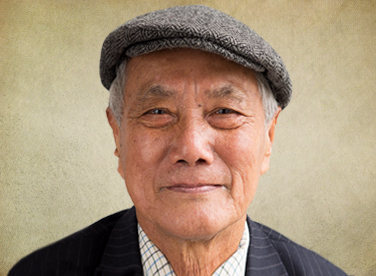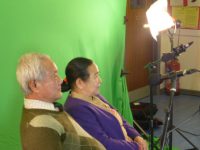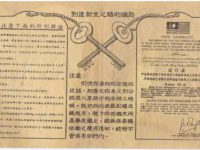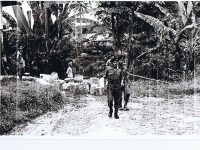Om Parsad Sherchan (Pun)
Om Parsad Sherchan (Pun) Warrant Officer 2
(Portrait © Gurkha Voices Oral History Project)
Om’s background story illustrates how desperate he was to enlist as a Gurkha when he was a teenager. Om’s last name is Sherchan which is a sub-tribe of the Thakali tribe. At the age when Om wanted to join the Gurkhas in the 1950s there was a strict policy that the Thakali/Sherchan tribe was not allowed to enlist. So Om enlisted with Pun as his tribe name. Since those days Om has legally changed his name and papers to Sherchan again. Extracts of Om’s life story, with transcription, is shown below, as told by our volunteer interpreter.
Om features in our short film on our website if you click here.
(More veteran stories are in our book, published later this year. Keep posted via our blog: www.gurkhastories.wordpress.com)
-
Om and his wife, Dilkumari filming Gurkha Stories
-
Malay Emergency Surrender Leaflet (a multi lingual Safe Conduct for those who surrendered to the British Forces during the Malay Emergency)
-
Supply drop for troops
-
Audio 1
-
Audio 2
Audio 1 (interpreter voiceover, 37 secs)
Our everyday life here is very good, the government has provided us everything including housing. We are staying together in a group at Abbeygate and this has made our life easier. The shops are nearby for any shopping and we do not have any problems at the moment. Everything is good.
We have come to the UK, a foreign land, leaving our motherland behind. The British government has given us the opportunity to come here, given us shelter and happiness.
I would like to thank the British people. Wishing them to be prosperous, what else can I say? In Nepal, the lifestyle is very hard. It was very difficult to make ends meet whereas; here the government has provided us with shelter. It is warm for old people like us.
Audio 2 using voice of interpreter (1 min 32 secs)
In 1963, we had to go to the Brunei war. We worked as SAS during the war. Times were very hard. We thought we were not going to make it back alive. Why? Because at that time we had one British officer, myself as a medic, an engineer who cleared away areas and handled cash and a radio operator from the Signals. There were just four of us who went on an operation in that hostile Brunei jungle. It was not just for one or two days, it was for one or one and a half month at a time. We even infiltrated the Indonesian camp and sent back valuable intelligence. We spent months in the jungle, just the four of us. That was a difficult time and at that time we did not have hopes of returning back alive.
The officer advised that at nightfall, we go to the local village. During daytime, we would remain in the jungle and at nightfall go the village. We carried various goods with us from the drop zone. We gave our goods to the locals. So at night when we went to the village we had to win the hearts of the locals. We gave them what we had such as clothing etc. At 5am we would wake up and head for the jungle. The locals would help us and would advise where to stay. We did not have any hopes of living.
Interview extract based on interpreter's translation (no audio available)
The biggest and happiest moment was when I got married in 1961. After marriage, I had to leave my wife behind when we were meant to be together. Parting away from each other was very difficult. I had to wait another 3 years to meet her again.There was no opportunity to go back in between. Waiting for 3 years was a test.
During that time, there was no telephone so talking to each other was impossible. The only communication we had was when we got letters from each other or word of mouth. We eagerly waited for the letters to come. When the letters came we were so overjoyed that we would keep reading and cherish them. The letter used to arrive at 3 months, 5 months and 6 months time. It took a month’s time for the letters to arrive through the post and at times it took longer. In addition, if I sent my letter back home with a colleague who was going on Nepali leave for 6 months I had to wait for 6 months to receive a letter from back home.
When the day for my own Nepali leave came, it was so much fun. Thoughts oozed, “When can I reach home, when can I reach home?” …All this time we eagerly waited for the flight day. Once we reached home that moment will remain the happiest moment ever. That was my happiest moment. When I returned this time round I was lucky and could bring my family along with me in my second leave. I was very happy.
Oral histories: © Gurkha Voices Oral History Project




